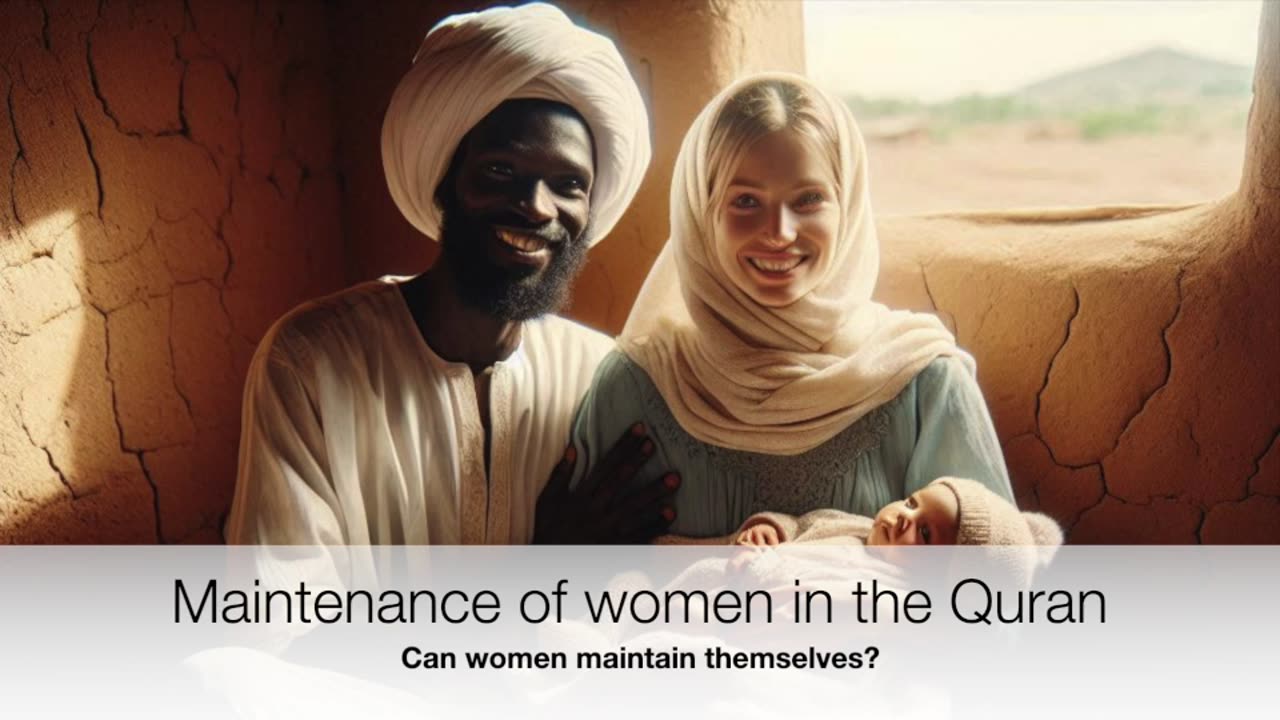Premium Only Content

Maintenance of women and the Quran
The Right to Maintenance
If you were to ask any Muslim regarding a woman’s right to maintenance they’d be able to tell you something about it. However, a lot of what is said regarding women’s maintenance lacks nuance and context. I have decided, therefore, to quote an entire segment of Surah Al Nisa here to discuss the manner in which Allah addresses women and orphans almost interchangeably and why it is that maintenance of women is critical in the Qur’an and also in society:
In the Name of Allah the Compassionate the Merciful
O mankind, fear your Lord, who created you from one soul and created from it its mate and dispersed from both of them many men and women. And fear Allāh, through whom you ask one another, and the wombs. Indeed Allāh is ever, over you, an Observer.
This verse shows us that the rights we are given are due us because Allah gave them, and not because we decided they are rights.
And give to the orphans their properties and do not substitute the defective [of your own] for the good [of theirs]. And do not consume their properties into your own. Indeed, that is ever a great sin.(4:2)And if you fear that you will not deal justly with the orphan girls, then marry those that please you of [other] women, two or three or four. But if you fear that you will not be just, then [marry only] one or those your right hands possess [i.e., slaves]. That is more suitable that you may not incline [to injustice]. (4:3)
The above two verses (4:2) and (4:3) should be read together. Unfortunately, because people have tried to argue against polygyny they have decontextualised the verse which happens to mention it but missed the entire discussion underway in the process. The Qur’an is dealing with orphans, women and money as a theme in Surah al Nisa. Mainly it is guarding women’s wealth against stingy guardians who do not want to release the wealth of the orphans or who want to marry women and not spend on them equitably or simply because they do not have the means to marry. Men who were guardians of orphan girls had to, according to the Qur’an, give the orphan girls their wealth when they reached
the age of marriage as we already mentioned above. Instead of releasing the orphan girl with her wealth the guardian would set out to instead marry the orphan girl himself and keep her wealth.
The Qur’an then sets out to tell these men, in lay persons terms, “Look, you can marry any number of women, so why not do that instead of trying to usurp the orphans wealth? But assuming you do marry then:
And give the women [upon marriage] their [bridal] gifts graciously. But if they give up willingly to you anything of it, then take it in satisfaction and ease.(4:4)
Still on the theme of stinginess, the Quran continues to remind men to spend. It is addressing people amongst whom there are those who want to usurp the wealth of the orphan by justifying it through marriage. The Quran is countering that justification in ten verses, not just one.
And do not give the weak-minded your property, which Allāh has made a means of sustenance for you, but provide for them with it and clothe them and speak to them words of appropriate kindness.(4:5)
However, if the orphan under your care (who came with their own inheritance) cannot manage property well on her own, then you manage the property and use it to to provide for her. The segment then ends with “Indeed, those who devour the property of orphans unjustly are only consuming into their bellies fire. And they will be burned in a Blaze [i.e.,
Hellfire].” (4:10).
As you can see this is not at all about marrying the orphans, it’s about looking after them. However, because wives, that which your right hand possess and the theme of orphans are interwoven we get the sense that women should be looked after like orphans. Notice that these orphans are being looked after with their own money if needed, and also when the Surah gets to inheritance then men inherit half of what their wives have.
All this assumes throughout the Surah that women have wealth of their own and that their wealth actually goes towards something either regarding themselves, or even inherited by their husband’s no less. In fact, husbands inherit more from their wives than wives inherit from their husbands. So we get back to the question of maintenance. Where is the obligation of maintenance?
It is implicitly implied, and at times explicit. For example, when the verse above says, “if you cannot do justice then only one or that which your right hand possesses..” It is talking about wealth. We know this because of the following verse:
And whoever among you cannot [find] the means to marry free, believing women, then [he may marry] from those whom your right hands possess of believing slave girls. And Allāh is most knowing about your faith. You [believers] are of one another. So marry them with the permission of their people and give them their due compensation [i.e., mahr] according to what is acceptable. [They should be] chaste, neither [of] those who commit unlawful intercourse randomly nor those who take [secret] lovers. But once they are sheltered in marriage, if they should commit adultery, then for them is half the punishment for free women. This [allowance] is for him among you who fears affliction [i.e., sin], but to be patient is better for you. And Allāh is Forgiving and Merciful.(4:25)
The injustice is to marry women you cannot afford to look after financially. We also see that it is not preferred for the believer to marry “that which your right hands possess” as the verse states “to be patient is better.” In other words, it is better to wait until one has the means to wed free believing women. So it is obvious that having the means to marry is a necessary condition so that one can look after one’s woman financially. However, this is assuming the woman doesn’t herself have money. It becomes obvious when considering that the rich orphan is essentially financially dependent on herself even though she is under a guardian, that a woman can be cared for with her own money. We see that the rule of male maintenance of women isn’t hard and fast in the following verse:
And do not marry polytheistic women until they believe. And a believing slave woman is b e t t e r t h a n a p o l y t h e i s t , e v e n t h o u g h s h e m i g h t p l e a s e y o u . And do not marry polytheistic men [to your women] until they believe. And a believing slave is better than a polytheist, even though he might please you. Those invite [you] to the Fire, but Allāh invites to Paradise and to forgiveness, by His permission. And He makes clear His verses [i.e., ordinances] to the people that perhaps they may remember. (2:221)
To conclude, it is implicit in the many verses that talk about marriage or care of women and orphans that the responsibility either to have the means to marry or to manage the means that belong to the women without mixing it up with your own wealth, is needed in the event that they, the women, are unable to manage their money themselves. In other words, marriage requires wealth, whether it be a little or a lot. We can see from the above discussion that the approach is nuanced in the Qur’an regarding maintenance, but it predominantly places the responsibility on the man. A possible reason for this is that most women who get married fall pregnant and are largely incapacitated for long periods of time
and bare the the greater responsibility towards nurturing the infant children. Therefore, one cannot expect a person who ordinarily doesn’t make an income to support herself financially. However, in the case of women, as we saw with the orphans, who had a good inheritance, it was possible to use the inheritance on the orphans themselves. Since the Qur’an bundled the discussion of orphans along with the discussion of women and marriage it is easy to create this analogy.
-
 2:07:27
2:07:27
TheSaltyCracker
10 hours agoTrump Tower Bombed w/ Cybertruck ReeEEeE Stream 01-01-25
165K324 -
 8:15:58
8:15:58
FreshandFit
16 hours agoElon Musk BETRAYAL & Mass Censorship On X
213K90 -
 2:25:43
2:25:43
Darkhorse Podcast
17 hours agoLooking Back and Looking Forward: The 258 Evolutionary Lens with Bret Weinstein and Heather Heying
173K211 -
 5:50:16
5:50:16
Pepkilla
16 hours agoRanked Warzone ~ Are we getting to platinum today or waaa
120K7 -
 9:15:09
9:15:09
BrancoFXDC
14 hours ago $9.25 earnedHAPPY NEW YEARS - Road to Platinum - Ranked Warzone
103K4 -
 5:53
5:53
SLS - Street League Skateboarding
5 days agoBraden Hoban’s San Diego Roots & Hometown Win | Kona Big Wave “Beyond The Ride” Part 2
105K14 -
 6:03:57
6:03:57
TheBedBug
18 hours ago🔴 LIVE: EPIC CROSSOVER - PATH OF EXILE 2 x MARVEL RIVALS
107K9 -
 1:12:45
1:12:45
The Quartering
16 hours agoTerror In New Orleans, Attacker Unmasked, Tesla BLOWS UP At Trump Tower! Are We Under Attack?
170K268 -
 1:32:08
1:32:08
Robert Gouveia
18 hours agoNew Year TERROR; Trump Speaks at Mar-a-Lago; Speaker Johnson FIGHT
137K116 -
 22:21
22:21
Russell Brand
1 day agoVaccines Don't Cause Autism*
208K896